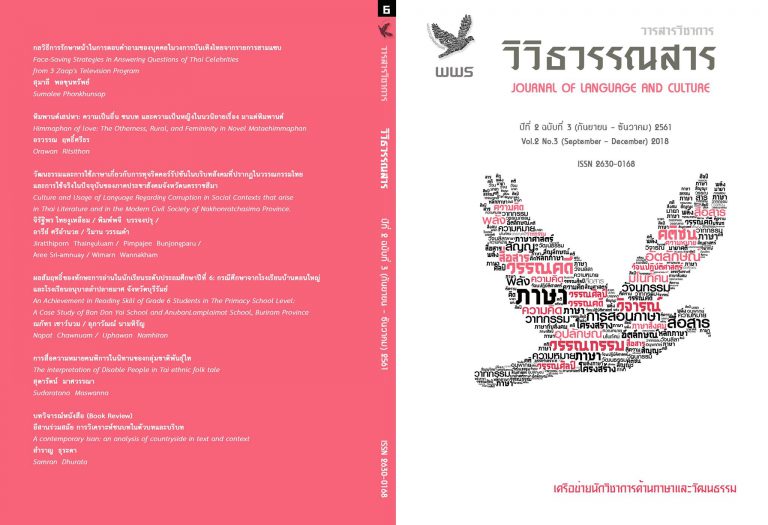Face-Saving Strategies in Answering Questions of Thai Celebrities from 3 Zaap's Television Program
Main Article Content
Abstract
The research aimed to investigate the “3 Zaap” which was the television program broadcasted on channel 3 every Sunday. The data was collected from 52 episodes of “3Zaap” television program that were broadcasted from July 2017 to July 2018. The study result showed that there were 11 Face-Saving Strategies in Answering Questions of Thai Celebrities from 3 Zaap” television programas follows: denying the assumptions, accepting the assumptions, answering vaguely, hedging, refusing to give answer, laugh, pleasantry, questioning the interview by means of rhetorical questions, avoid the answering, referring to other and self-abasement. This study revealed that image was the most important to Thai celebrities. They use dapolite language to answer questions to avoid a face-threatening act to themselves or others because their expression affected the popularity of people.
Article Details
Copyright is that of the journal any reproduction must be permitted by the editor of journal
References
phenomena. In E.N Goody (eds). Questions and politeness :
strategies in social interaction. (pp.55– 285). Cambridge:
Cambridge University press.
Buaphetch, P. (2006). Kon withi kan nam sanoe bukkhon nai
bot samphat phumi chue siang nai nittayasan phasa Thai.
(in Thai) [Presentation tactics in celebrity interview in Thai
women magazine]. Master’s thesis. Chulalongkorn University,
Bangkok.
Goffman.(1959). The presentation of self in everyday life. Garden City.
N.Y. : Doubleday Anchor.
Hongladarom, K. & Choksuwanit, T. (2008). Watchana patibat sat.
(in Thai) [Pragmatism]. Bangkok: Chulalongkorn University.
Lches, W. (Eds.). (2000). The social psychology of personal
relationships. New York: Wiiwy.
Ngamyingyuat, W .(2014). Kon withi kan raksa na nai kan top kham tham
chak rai kan Wutdi Koet ma khui. (in Thai) [Woody’s talk
program face-saving strategies in answering question].
Master’s thesis. Srinakharinwirot University, Bangkok.
Ongwutthiwat, S. (2010). Konlawithi thang phasa thi chai nai kan
top kham tham khong dara nak sadaeng Thai nai kan
samphat sue muan chon. (in Thai) [Linguistic strategies of Thai
celebrities when answering questions posed by the media in
interview situation]. Wannawithat, 10: 54-93.
Sinarawat, D. (2011). Laksana phasa khong nak rong nak sadaeng Thai
nai sue thorathat lae thatsanakhati to phasa thi chai. (in Thai)
[Features of Thai Entertainment Celebrities’ Speech and Attitudinal
Responses toward Their Speech Styles]. Journal of Language and
Linguistics, 30 (1): 13-41.
Thanchit, K. (2009). Kan nam sanoe khao kan yaek thang khong dara
lae patikiriya khong phu kiao khong. (in Thai)
[The reporting of the separation of performers and the reaction of
stakeholders]. Master’s thesis. Chulalongkorn University, Bangkok.
Watcharasuwan, P. (2004). Kon withi kan klao yaeng nai phasa Thai
khong phu thi mi sathanaphap tang kan: Korani sueksa khong
khru lae nak rian. (in Thai) [The act of disagreeing in Thai by
speakers of different social status : the case of teachers and
students]. Master’s thesis. Chulalongkorn University, Bangkok.
Witthayarat, S. (2002). Kan sue khao: witthayu–thorathat. (in Thai)
[News gathering: Radio-Television]. (3rd ed.) Bangkok: Book Center,
Suan Sunanda Rajabhat University


